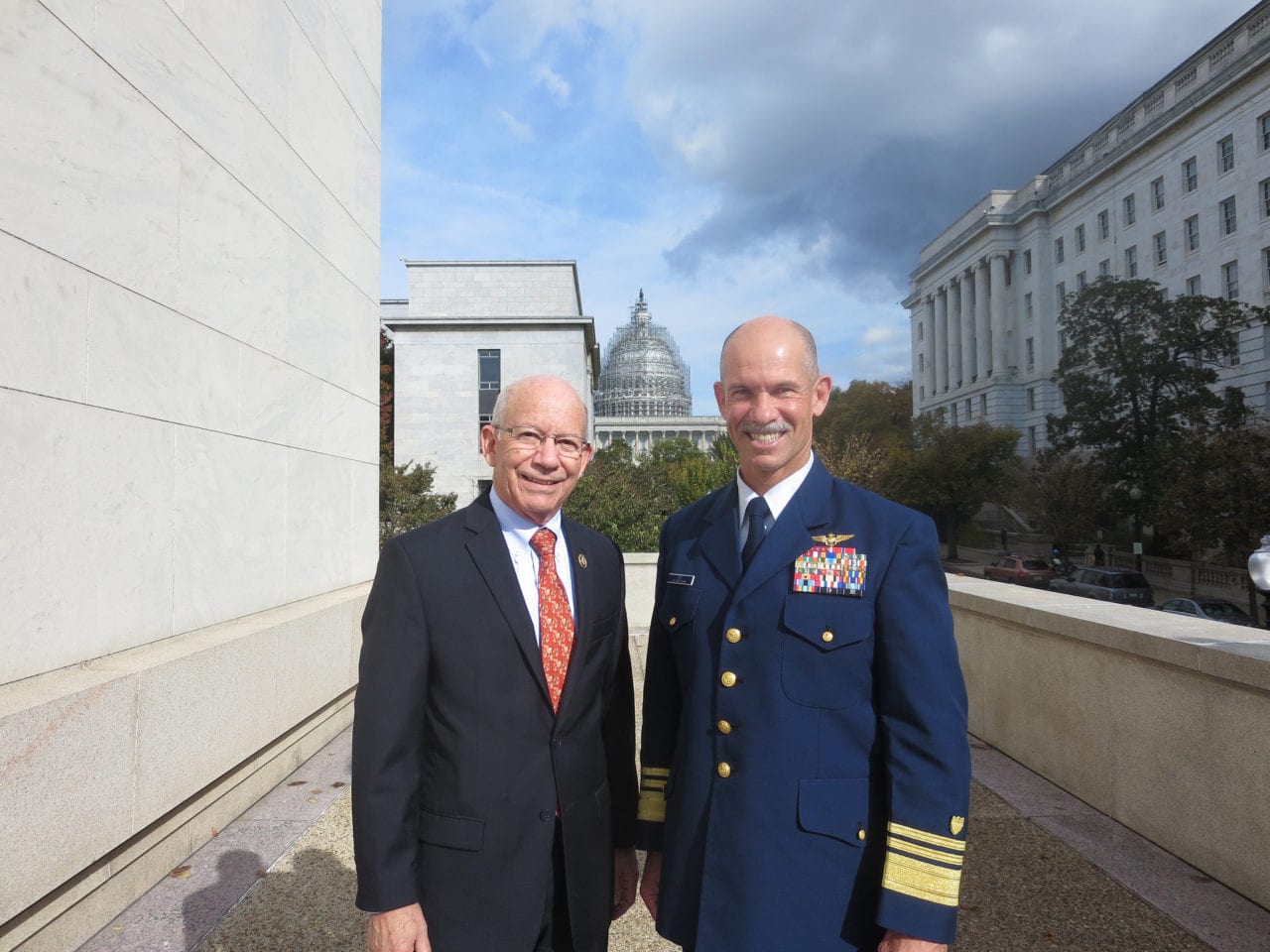
Congressman Peter DeFazio of Oregon with Admiral Charles W. Ray (Rep. DeFazio)
A new bill that would protect the FAA’s funding in the event of government shutdown was put forward Friday in the House of Representatives by Reps. Peter DeFazio, D-Ore., and Rick Larsen, D-Wash., the chairmen of the House Committee on Transportation and Infrastructure and Subcommittee on Aviation, respectively.
The proposed Aviation Funding Stability Act of 2019 would allow the FAA to keep all of its programs running and all of its employees working by drawing from its Airports and Airways Trust Fund during any lapse in typical government appropriations. According to DeFazio and Larsen’s release on the bill, the AATF brings in enough money from sources such as passenger, fuel and cargo taxes to fund the FAA without requiring additional appropriations.
“Allowing the FAA to draw from the Airport and Airway Trust Fund during a funding lapse will ensure essential personnel who work under immensely stressful situations continue to get paid, and that the largest, busiest and most complex airspace system in the world remains safe for passengers and employees,” said Larsen in a joint statement with DeFazio.
“The United States aviation system is the safest, busiest, most complex aviation system in the world — a system that was seriously jeopardized by the absurd 35-day government shutdown,” DeFazio said. “Thousands of FAA safety personnel responsible for providing critical oversight of the U.S. aviation industry were furloughed. … The effects of this most recent shutdown will be felt for years to come. This must not happen again. Our legislation ensures that in any future government shutdowns, all FAA programs will function uninterrupted and that all FAA employees can remain at work and paid. The users of the National Airspace System pay for the system and deserve for it to function without interruption.”
The language in the bill specifies that appropriations for FAA programs should be made available for programs at a rate not greater than “the rate for operations provided for in the regular appropriation Act providing for such program, project, or activity for the preceding fiscal year,” or, if none is available, pursuant to the rate in the preceding year.
The 35-day partial government shutdown was ended with a three-week temporary resolution agreed to by lawmakers partially due to concerns about aviation after air traffic controllers had trouble keeping up with traffic, causing delays or ground halts at major airports.
Last week, National Air Traffic Controllers Association (NATCA) President Paul Rinaldi called for a separate funding source for the aviation industry to help prevent such situations. At the time, he said he wasn’t sure if such a motion would have champions in Congress, but DeFazio and Larsen, whose Pacific Northwest constituency contains a lot of aviation workers, appear to have embraced the cause.
It is unclear at this point how broad the bill’s Congressional support will be. Lawmakers want to avoid causing widespread flight delays and hearings are revealing the magnitude of the long-term costs that funding lapses at the FAA will cause, but exempting one agency — particularly one that could be a powerful bargaining chip — from worrying about appropriations in that manner may be a hard selling point for some corners.
In the aviation industry, support is overwhelming. More than a dozen stakeholders have shown support, including the NATCA, Airlines for America, the General Aviation Manufacturers Association and Delta Airlines.
“The 35-day shutdown was just the latest of many instances in which FAA, its workforce, and the aviation industry were held hostage by a political fight that had nothing to do with aviation,” said NATCA President Rinaldi. “Stop-and-go funding crises wreak havoc on the personal lives of air traffic controllers and other aviation safety professionals, degrade the safety of the National Airspace System, delay critical modernization and infrastructure projects, and exacerbate the current controller staffing crisis.”
“Aviation is among the nation’s most regulated industries, requiring oversight and a host of services from the FAA,” said Ed Bolen, president and CEO of the National Business Aviation Association. “This bill would help ensure that aviation – a key component in the nation’s economy and transportation system – will avoid a potentially harmful disruption in the event of a government shutdown.”
“We strongly urge Congress to pass this crucial bill to ensure safe and efficient air transportation for our passengers and cargo shippers,” said Capt. Joe DePete, president of the Air Line Pilots Association. “Flying is the safest mode of transportation in the world thanks to the hardworking professionals who work in a complex, interconnected system. It is unconscionable that these essential aviation professionals were forced to work without pay during the recent shutdown, and we should never let that happen again.”
Congress is still holding hearings and conducting studies to determine the full impact of the shutdown on the aviation industry. Beyond the short-term cost, industry insiders are concerned about the long-term effect on staffing — which is already projected to be a sore spot in a growing industry — and infrastructure modernization programs by the time and money required to close and restart programs beyond just the month-plus of furloughs.